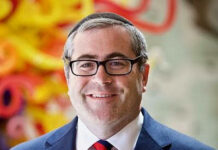
By Rabbi Joel E. Hoffman
The reality series “My Unorthodox Life” is the talk of the Jewish world since its airing on Netflix on July 14. The show’s star Julia Haart, who left her Ultra-Orthodox community in 2013 at age 42, quickly advanced in the fashion industry and is CEO of the modeling agency Elite World Group. In the show, Haart constantly bashes Orthodox Judaism with misrepresentations while trying to showcase that living a secular life is way better.
I am not writing to cast judgment on Haart for her life choices. Judaism forbids me from judging anyone but myself. Rather, what follows is a counter perspective to Haart’s propaganda against Judaism in general, and Orthodox Judaism in particular.
My Orthodox Life consists of …
(1) Immediately upon waking up in the morning my first words are “Modeh Ani Lifanecha …” which thank God for giving me another day. Also, three times per day I engage in formal prayer, and throughout the day I say a blessing before and after eating or drinking. The first series of prayers in the morning reminds me of dozens of gifts from God such as a properly working digestive system, eye sight, clothes and freedom. Praying and saying blessings helps me foster a sense of appreciation, which is a key component for living a happy/joyous life.
(2) A staple of everyday Jewish life includes studying Jewish texts. My daily study regime entails studying Tanach (Hebrew Bible), which is full of moral and ethical teachings, analyzing fine points of Jewish law and engaging in deep-thinking on concepts in Jewish philosophy. When I pray I speak to God, but when I study God “speaks” to me — which means I obtain answers to ultimate questions, and every day I encounter a teaching that is apropos for something current in my life.
(3) By eating only kosher food I concretize the value of all life. This is because the kosher slaughtering process is the most ethical way to end an animal’s life since it assures the quickest death with the least amount of pain. Keeping kosher is Judaism’s compromise with vegetarianism.
(4) Throughout my day I try to live according to the Jewish maxim: “Think Good and It’ll Be Good,” as well as the teachings: See the good in every person; see the positive in every situation; and view every challenge as an opportunity. Perhaps the hardest commandment to observe is not speaking “Lashon Hara” — which is not to say something about a person that I would not say if that person was present. Trying to live by these ideals is the ultimate in personal development.
(5) No essay about Judaism would be complete without discussing Shabbat. Every Friday night I enjoy akin to a Thanksgiving dinner with my family, and for 25 hours I am free from all appointments and refrain from using technology — so no using a cellphone, computer or car. Plus, all the food I intend to eat on Saturday is cooked before Shabbat. Shabbat aligns a person to spend one day per week focusing on only the important things in life: family, camaraderie with other Jews, praying and learning, while getting mental and physical rest. A Shabbat afternoon nap is amazing! (Why did afternoon naps stop after kindergarten?!)
If God ever said we no longer had to keep Shabbat, probably 99.99% of Jews who traditionally keep Shabbat would continue to do so.
Haart has rejected all the above and says she gets meaning from being “free,” which for her manifests in wearing sexy outfits and eating oysters; and she also purposely uses the biased word “Fundamentalism” to badger Orthodox Judaism.
Interestingly, Haart’s show co-stars her three adult children, of which two have remained Orthodox and they concurrently demonstrate that one can be an observant Jew even while working in the fashion industry. (Haart also has a teenage son who is Orthodox, lives with his dad and appears on the show.)
There are aspects of the show which I like and I intend to watch future seasons, but my focus here is on My Orthodox Life. As one can hopefully see from this essay, the more Jewish practices in which a Jew engages, the more meaning he or she will add to their life. l
Joel E. Hoffman is ordained as a rabbi but works as a math and special education teacher.







As an observant orthodox Jewish woman I agree with his stance in support of orthodox Judaism. However I am deeply annoyed and frustrated by male centered responses and reactions to this show. Julia’s claims against orthodoxy, while childish childish, incohet, and without nuance, are unnuanced are valid and deserve attention and discussion. This is what so many of us in the orthodox movement are trying to do.
So write a female centered response!